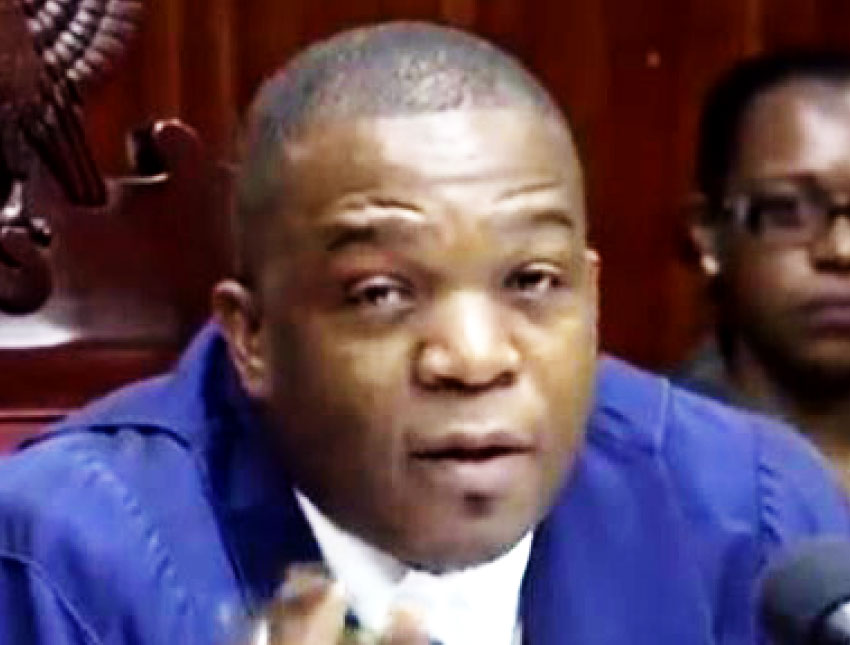THE expected fireworks in the House of Assembly on Tuesday over the motion that the House calls for the immediate resignation of Allen Chastanet as Prime Minister did take place. However, it was Speaker Andy Daniel who saved the day — until the end.
But while the motion was defeated shortly after midnight (Wednesday morning) by sheer numbers — 11 for the government versus the opposition’s six), Philip J. Pierre and his fellow Labour MPs, except former opposition leader Dr. Kenny Anthony, did lay out, in full, their reasons why the House should have expressed a total lack of confidence in the leadership of PM Chastanet.
But it was a close call for the opposition, which faced several attempts by the government parliamentarians to end the debate prematurely.
However, what many government and ruling party supporters, as well as MPs, found to be an overly accommodating Speaker turned out to be a principled presiding officer who understood not just the letter of the law, but how and when such laws should come into play and how justice should be dished out so as not to infringe the rights of the minority.
Tuesday’s House session also tested Daniel’s shrewdness and practical knowledge as a politician, lawyer, citizen and interpreter of the rules as contained in the Standing Orders, as government parliamentarians took turns to painfully plead for Mr Speaker to bring end the debate as early as possible.
First was Economic Affairs Minister Guy Joseph, who, shortly after Pierre started presenting the motion, quoted Section 35 (6) of the Standing Orders Joseph to claim that no member of the House can be referred to by name in a motion tabled before the House.
Joseph also quoted Section 60:6 of the Constitution to claim the motion was also unconstitutional.
But the Economic Affairs Minister never bargained for what he received next – a lesson in parliamentary procedure that he should never forget.
Daniel agreed that Section 35 (6) of the Standing Orders addresses the matter of members not referring to each other by name, but went on to state that he cannot accept Joseph’s submission due primarily to the nature of the motion before the House – a motion against the prime minister himself and only — in which case, the name of the prime minister had to be placed in the text and mentioned in the debate.
Addressing the Castries South East MP, the Speaker said: “I say to you that when I Andy Daniel sits in this chair, I aim to be fair to members of this Honourable House.”
“There is nothing unconstitutional about this motion being in the name of the Honourable Prime Minister, or in his office, or in any other minister, or member, sitting around this table,” Daniel said in response to Joseph’s challenge.
The Speaker made reference to several provisions of the Constitution and Section 21 of the Standing Orders to underscore and solidify his position that the debate should go on. However, he seems to have stumbled at an unguarded moment towards the end of the debate, when he admittedly noticed the request lights on the microphones of both Vieux Fort South MP Dr. Kenny Anthony and Dennery South MP Edmund Estaphane were on at the same time.
Uncertain as to which of the two he should decide on to speak, Daniel hesitated – and then asked the two which would like to speak first. Dr. Anthony opted to allow Estaphane to speak first.
“I’ll give way to him,” Anthony said, whereby Estaphane stood and immediately invoked Standing Order 38 (1) to end the debate, claiming that ‘The minority’ was not suppressed in bringing its case of no confidence in the prime minister to the House.
Speaker Daniel then went on to acknowledged Estaphane’s submission and was about to put the question to the House that would end the debate when Dr. Anthony interjected, telling Daniel he was not in a position to determine which light came on first.
“Look at the circumstances that occur tonight. I gave way in good faith,” noted Dr. Anthony, “that is to say on the assumption that the member would be making his presentation or wanted to make his presentation.”
“Clearly, in that kind of situation where I gave way in good faith, it has to be an infringement on my right to speak, to respond, when it is obvious that there was confusion between the two members as to their intent tonight,” Dr. Anthony said.
Claiming that he saw “no infringement on the right of the minority,” Speaker Daniel entertained Estaphane’s submission, put the motion to the vote and after the expected count, endding the day’s marathon proceedings.














